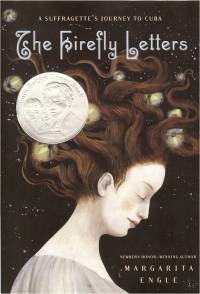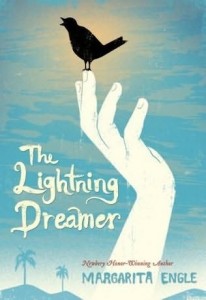 I could nobly claim that I skipped ahead in my reading queue in honor of the eighth June observance of Caribbean-American Heritage month. The truth is the celebration gave me an excuse to skip ahead to two books I’d been saving to savor like pecans in a can of mixed nuts.
I could nobly claim that I skipped ahead in my reading queue in honor of the eighth June observance of Caribbean-American Heritage month. The truth is the celebration gave me an excuse to skip ahead to two books I’d been saving to savor like pecans in a can of mixed nuts.
I’d been conscripted to read books and share my opinions with a friend who was on ALA’s Newbery Awards Committee. You can guess what a burden that was! I met Margarita Engle’s work in The Surrender Tree: Poems of Cuba's Struggle for Freedom. It made my short list, and then the Newbery Committee’s selection as an Honor Book. Okay, okay. So the committee didn’t see or care about my short list. You may also guess which list actually mattered.
This was part of my critique: “This book will rid myself of any prejudice against a novel in verse! This is a beautifully written, gripping account of the Cuban wars for independence as seen through the eyes of Rosa and others who were the healers or the hunters. There are no flaws.”
Afterwards I read The Poet Slave of Cuba: A Biography of Juan Francisco Manzano and became a dyed-in-the-wool fan of Margarita Engle. When I read about this month’s observance, I pulled out The Firefly Letters: A Suffragette’s Journey and The Lightning Dreamer: Cuba’s Greatest Abolitionist from my reading queue. 
Based on solid research of a true story, The Firefly Letters has three females, each bound by slavery or society’s expectations into roles that rob them of freedom. Fredricka, the Swedish suffragette, and Elena, the rich Cuban’s daughter are born into roles with expectations established by wealth and position. Cecelia, sold by her father in exchange for a stolen cow and shipped to Cuba, has even fewer choices as a slave. Symbolically flitting through the story are the cocuyos, Cuban fireflies who move freely until caught and imprisoned in jars by children. Fredricka and Cecelia foreshadow the book’s satisfying ending when they buy freedom for the cocuyos.
The Lightning Dreamer: Cuba’s Greatest Abolitionist, also based on a true story, follows Tula who defies her mother’s belief that girls who read too much are unladylike and ugly. Befriended and encouraged by the nuns in the orphanage where she volunteers and inspired by the rebel poet Heredia, she writes her own poems that eventually embolden her family’s long-time freed servant Caridad to leave and seek a better life. The winding poetic tale traces her life until her novel’s words transform her into Cuba’s Greatest Abolitionist. A sample quote from the book:
and inspired by the rebel poet Heredia, she writes her own poems that eventually embolden her family’s long-time freed servant Caridad to leave and seek a better life. The winding poetic tale traces her life until her novel’s words transform her into Cuba’s Greatest Abolitionist. A sample quote from the book:
“So many people
have not learned
that souls have no color
and can never
be owned.”
Now Hurricane Dancers: the First Caribbean Pirate Shipwreck goes into my queue.
You’ll enjoy Margarita Engle’s work if you like any of the following: a really good story, a setting that takes you to another time and place, fine wordsmithing, poetry, justice, or cultural diversity. It will take you to places and times outside your comfort zone [otherwise known as a rut].
Happy reading and Happy Caribbean-American Heritage month!